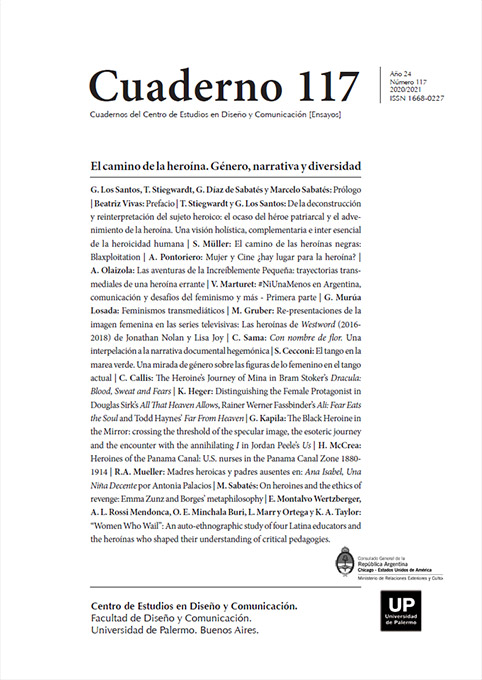El camino de las heroínas negras: Blaxploitation
Abstract
In the United States feminism did not originate from the women that were more directly victims of the sexist oppression; mentally, physically and spiritually beaten daily; women without the necessary strength to change their life conditions” (Hooks, 2004, p.33). Feminist activists were white and wealthy class even as black women were a silent majority. Although many women were part of Black Power, the movement was defined and assembled in the media, the pop culture and the arts by men. These groups maintained a patriarchal organization; structures constituted by male leadership. They “realized of the nature of the male domination when participating in anti-classist and anti-racist spaces with men who spoke to the world about the importance of freedom despite subordinating the women among their own ranks” (Hooks, 2017, p.22). There was neither a place destined for black women amongst white feminists nor the Black Power of men.
References
Altman, R. (1999). Film Genre. Londres, UK: BFI.
Álvarez Ossa, L. (2015). Mujeres, pobres y negras, triple discriminación: Una mirada a las acciones afirmativas para el acceso al mercado laboral en condiciones de trabajo decente en Medellín (2001- 2011). Medellín, Colombia: Escuela Nacional Sindical.
Bairros, L. (2000). Nuestros feminismos revisitados. Política y Cultura, (14), 141-149. D.F., México: Universidad Autónoma Metropolitana.
Bellucci, M. (2013). Movimiento de Liberación de la Mujer en EEUU: «Ahora trabajamos para nosotras». Pikara Magazine. Disponible en https://www.pikaramagazine.com/2013/04/movimiento-de-liberacion-de-la-mujer-en-eeuu-ahora-trabajamos-paranosotras/ Fecha de consulta: 28/01/2020
Deann Seifert, M. (2012). Who’s got the “reel” power? The problem of female antagonisms in blaxploitation cinema. Alphaville: Journal of Film and Screen Media, (4), 1-17.
Ferro, M. (1995). Historia contemporánea y cine. Barcelona, España: Ariel.
Goyeneche-Gómez, E. (2012). Las relaciones entre cine, cultura e historia: una perspectiva de investigación audiovisual. Palabra Clave, 15(3), 387-414. Bogotá, Colombia: Universidad de La Sabana
Harris, A. y Mushtaq, O. (2013). Creating Racial Identities Through Film: A Queer and Gendered Analysis of Blaxploitation Films. The Western Journal of Black Studies, 37(1), 28-38.
Hooks, B. (2004). Otras inapropiables. Feminismos desde las fronteras. Madrid, España: Traficantes de Sueños.
Hooks, B. (2017). El feminismo es para todo el mundo. Madrid: Traficantes de Sueños.
Hooks, B. (1996). Reel to Real: race, sex and class at the movies. East Sussex, UK: Psychology Press.
Imdb (s/f). Foxy Brown (1974) Disponible en https://www.imdb.com/title/tt0071517/ Fecha de consulta: 8/02/2020
lawrence, N. (2007). Blaxploitation films of the 1970s: Blackness and genre. New York: Routledge.
Narcea, K. (2015). Los orígenes. Albedo media. Disponible en https://www.albedomedia.com/cultura/cinechrome/blaxploitation-los-origenes/ Fecha de consulta: 24/01/2020
Narcea, K. (2015). Ellas dan los golpes. Albedo media. Disponible en https://www.albedomedia.com/cultura/cinechrome/las-heroinas-de-blaxploitation/ Fecha de consulta: 24/01/2020
Quinn, E. y Krämer, P. (2006). Blaxploitation. Contemporary American Cinema, 184-198. London: Open University Press.
Sims, Y. (2006). Women of Blaxploitation: How the Black Action Film Heroine Changed American Popular Culture. Carolina del Norte: McFarland & Company.
Sorlin, P. (1985). Sociología del Cine. La apertura para la historia de mañana. D.F., México: Fondo de Cultura Económica.
Terry, J. (2012). Towards the Gendering of Blaxploitation and Black Power. Madison Historical Review, 9, 79-105. Disponible en http://commons.lib.jmu.edu/mhr/vol9/iss1/5 Fecha de consulta: 1/02/2020.
Los autores/as que publiquen en esta revista ceden los derechos de autor y de publicación a "Cuadernos del Centro de Estudios de Diseño y Comunicación", Aceptando el registro de su trabajo bajo una licencia de atribución de Creative Commons, que permite a terceros utilizar lo publicado siempre que de el crédito pertinente a los autores y a esta revista.


